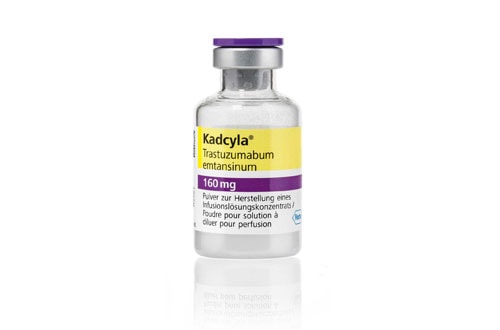
Roche’s Kadcyla showed no significant improvement in progression free survival over Herceptin in patients with HER2-positive breast cancer
Roche’s pipeline took a double hit today with disappointing trial results in both Alzheimer’s disease and oncology.
The Swiss pharma company will discontinue a phase III programme investigating its anti-amyloid medicine gantenerumab in people in the early stages of Alzheimer’s after an analysis of interim data.
The SCarlet RoAD study was the first programme to evaluate a potential disease-modifying medicine in such an early stage of Alzheimer’s disease, an area of increasing interest for companies in the area considering multiple trial failures for investigational treatments in a later stage of the neurological condition.
The latest announcement from Roche will dampen these hopes, although the company said it was committed to research in the area.
“We are disappointed with these study results because people with early stage Alzheimer’s need new medicines that delay disease progression,” said Dr Sandra Horning, chief medical officer and head of global product development at Roche. “We remain committed to investigating new medicines for this devastating illness.”
Roche has not given up on gantenerumab completely, and the drug is still to be evaluated in additional trials, including the phase III Marguerite RoAD study (WN28745) involving patients with later stage of Alzheimer’s disease
The company also has two other investigational medicines for the disease in phase II development: crenezumab, another anti-amyloid antibody, and RG1577, a monoamine oxidase-B inhibitor.
Kadcyla failure in breast cancer
There was additional frustration for Roche with the news that its highly touted oncology drug Kadcyla (trastuzumab emtansine) was no better than its older oncology product Herceptin (trastuzumab) in improving progression free survival in patients with a certain type of breast cancer.
The company evaluated three different cancer regimens in treating people with HER2-positive breast cancer as part of the MARIANNE study. The regimens were Kadcyla plus Roche’s Perjeta (pertuzumab), Kadcyla alone and Herceptin plus taxane chemotherapy.
Each regimen demonstrated it was able to help people live without their disease worsening for a similar amount of time, however there was disappointment as neither Kadcyla-containing regimen showed a significant improvement in progression free survival over the Herceptin regimen.
This is a blow to Roche as it is looking to market the newer Kadcyla as a superior replacement for the older Herceptin, which is set to face generic competition as its global patents expire in the next few years.
“In this study, we had hoped to show improvement in progression-free survival without the use of traditional chemotherapy in the first line treatment of patients with advanced HER2-positive breast cancer,” said Dr Horning.
“While MARIANNE didn’t achieve this result, we will continue to study these medicines, as well as investigational treatments for other types of breast cancer, with the goal of improving outcomes for patients.”




